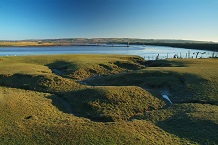Articles

The project aims to raise new income from sustainable tourism by creating networks of ‘eco-engaged’ tourism businesses.
Research partners join forces to develop a new sustainable way of managing tourism across four Biosphere Reserves in France and England
A cutting-edge project to increase the economic value of tourism while reducing its potential environmental impact is underway in the four Unesco Biosphere Reserves of the Channel region. Professors Matt Lobley and Michael Winter and Dr Tim Wilkinson will be representing the CRPR as a lead partner in this project.
The three-year £3.5million Bio-Cultural Heritage Tourism (BCHT) project will develop a new sustainable way of managing tourism across four Biosphere Reserves in France and England, with principal funding from the EU ‘Interreg France (Channel) England Programme’.
These Unesco Biospheres are the Marais Audomarois and Iles et Mer d'Iroise in France and the Brighton & Lewes Downs and North Devon in the UK.
The project is being delivered through a partnership of organisations running the Biosphere Reserves - Devon County Council, Brighton and Hove City Council, Communauté d’Agglomération du Pays de Saint-Omer, Parc naturel régional des Caps et Marais d’Opale, Parc naturel régional d’Armorique and the Parc Naturel Marin d’Iroise – and resources partners, such as Pas-de-Calais Tourism and University of Exeter.
The UNESCO World Network of Biosphere Reserves covers 669 internationally designated protected areas in 120 countries. Biosphere Reserves demonstrate a balanced relationship between people and nature. Due to their stunning landscapes and natural heritage, these areas attract many visitors. In a typical year more than 20 million people visit the four Biospheres.
The project aims for tourism on the four Biospheres to benefit the site both environmentally and economically, as pilot areas for a new approach through ‘bio-cultural heritage tourism’ that can be adopted by natural heritage sites more widely.
It aims to improve the experience of visitors and tourism income, manage visitor impact on natural heritage sites, support tourism businesses in the creation of a new offer, and encourage the participation of local bodies in this approach.
There are concerns that high numbers of visitors can damage the environment in the four areas and affect the quality of life of those who live there. The project will develop a new sustainable way of managing tourism to reduce and hopefully reverse the negative impact of high tourist numbers.
This will be done by encouraging tourism providers of visitor activities to focus on the interdependence between the local way of life and the environment.
The strategy includes monitoring tourist numbers and identifying ways of encouraging visitors away from over-visited attractions to areas within the Biosphere that have capacity for new visitors.
The project also aims to raise new income from sustainable tourism by creating networks of ‘eco-engaged’ tourism businesses.
Existing and new businesses, including providers of visitor activities, will be encouraged to develop new niche products and services through tourism experiences that promote and sustain the reserves.
For example, visitors to a ‘potager conservatoire’ or traditional conservatory vegetable garden in Audomarois would help conserve local varieties of produce by taking part in an activity to cultivate and use them.
By showing how cultural practices can sustain the landscape, the project will offer an authentic experience to visitors and encourage them to get actively involved in helping to conserve nature both on their holiday and when back at home.
